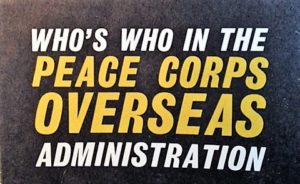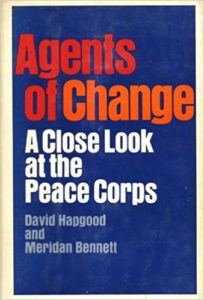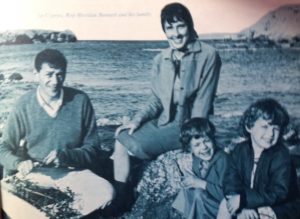Cyprus’ First (and only) Peace Corps Staff
 When newly independent Cyprus showed an interest in inviting the Peace Corps, the Near East-South Asia regional office sent Patricia Sullivan to Nicosia, the island’s capital city. Miss Sullivan, who later became operations officer for Nepal and Afghanistan as well as Cyprus, arrived in Nicosia on January 9, 1962, and remained until early April.
When newly independent Cyprus showed an interest in inviting the Peace Corps, the Near East-South Asia regional office sent Patricia Sullivan to Nicosia, the island’s capital city. Miss Sullivan, who later became operations officer for Nepal and Afghanistan as well as Cyprus, arrived in Nicosia on January 9, 1962, and remained until early April.
Toward the end of April, Associate General Counsel Roger Kuhn, then discussing a program in Turkey, flew over from Ankara for three days to assist with a few technical points in the program note.
When Miss Sullivan flew back to Washington, the first Cyprus program, which called for geologists, teachers and agricultural extension workers, was ready to go.
The 23 Volunteers who were sent to the island went into training nine weeks later at Howard University. Meridan Bennett, the Representative in Cyprus, shared part of the training with them.
Born in Minneapolis, “Med” Bennett was raised on a cattle ranch in the southwest corner of Alberta, Canada. The one-room school which he attended for the first four grades was, as he reported, “the first building on the right as you drive out of Water Lakes National Park.”
He worked on the ranch every summer from the age of nine until he was called into the army in 1945 for one year’s service “in which I ended up a corporal in the Finance School at Lowry Field.” A graduate of Phillips Andover Academy, he entered Yale in 1947 under an accelerated program in which he obtained a degree in geology in three years. After taking a second degree in animal husbandry at Montana State University, he went into partnership with his brother in operating a 2300-acre cattle ranch in Alberta.
Four years later, he decided to devote himself to writing. In one year holed up in Jackson Hole, Wyo., he produced a novel.
The Columbia pictures production of “Jubal” was then being filmed in Jackson Hole, and Bennett went to work for the company as a chauffeur, wrangler and extra.
“I was usually able to get three salaries every working day. In five weeks, I made enough money to take my wife to Europe for a year. This turned out to be a very unproductive move. We did a lot of sightseeing while I did almost no writing.”
Returning to Montana, he took odd jobs—as a boat and motor repair man, with the State Library’s book mobile program—while he plunged furiously back into writing.
An ardent skier, he has a closetful of ribbons won in competition including the 1961 Sun Valley championship in the giant slalom. In the winter of 1961-62, he organized and operated a ski school at the newly developed Missoula Snow Bowl in the Rockies. When spring arrived and the snow melted, Bennett came to Washington “where I found that my ideas were completely in tune with the Peace Corps.”
Miss Sullivan returned to Cyprus on August 28, and the Volunteers flew into Nicosia on September 6. By the end of September the PCVs had gone to their assignments throughout the bilingual island.
Research Document: Who’s Who in the Peace Corps Overseas Administration (1963)
The photographs are by Rowland Scherman, Paul Conklin and Jim Walls, first photographers for the agency.
Note:
After his tour as CD in Cyprus, Bennett would return to PC/HQ and become an evaluator. In 1968, he and another evaluator, David Hapgood, published with Little, Brown and Company, Agents of Change: A Close Look at the Peace Corps.
In their acknowledgements they would write in part:
This book is anything but official. The Peace Corps has generously given us permission to draw on reports that we and others have written for the agency. But no one has tried to influence, still less censor, what we have to say. The authors, therefore, bear full responsibility for the contents.
Between us, we have evaluated seventeen oversees programs and visited many more, out travels covering three continents. Charles Peters, who headed the Peace Corps Division of Evaluation from 1962 to the spring of 1968, has helped us in ways too numerous to mention.
The unique process of self-criticism known in the Peace Corps as evaluation would never have existed without Charles Peters’ courage and imagination. No one loves a critic; but Peters always supported us when the going got rough.
Volunteers are what the Peace Corps is all about, and they are what this book is all about. Hundreds of volunteers in out-of-the-way corners of this world have not only taken time to answer the questions of two nosy visitors; they also gave us shelter, shared with us their food and drink, and permitted us to know their friends—allowed us to share with them some part of their encounter with the third world. Their experience, as they permitted us to see it—insisted, in many cases, for volunteers typically are immensely concerned with conveying the reality of their situation—is the human fabric of which this book was made. The book, therefore, has many anonymous collaborators.
D.H. and M.B.

I encountered Meridan Bennett in late March or early April 1964. I had been in Colombia for about five months. I believe my site was one if not the first site Bennett would visit as an evaluator for Peace Corps. It had been a rough few months for Volunteers in my area and everyone. My partner had left when she learned her father was dying. Another Volunteer had been medical evacuated when serious symptoms of amoebic dysentry reoccurred. And, of course, the Kennedy assassination.
Neither Bennett nor I was in a concillatory mood. He was the first staff member from Washington that I had seen. He looked shellshocked, in his starched blue botton down shirt and khaki pants. Cyprus had been closed and Kennedy had been assassinasted. I felt shellshocked. The visit was a semi-surprise. I was really not prepared. He asked me how things were going
I almost exploded with frustration. I was a poli sci major given an assignment as a health educator. I explained to Bennet that we were wholly untrained and not prepared for the desperate conditions we would encounter. The women with whom I had begun to work needed resources and trained clinical people. I was not well trained and we had no special resources.
Women counted their families by naming first their babies, who had died, and then the babies who still survived. It was an awful ratio.
I emphasized to Bennet this high rate of infant mortality. His response? He said that the world had a overpopulation problem, so why was I worried. I screamed at him, then why am I here. It did not go well.
Forty years or so later, I was at the National Archives , I began reading some of the evaluation reports from Charlie Peters great evaluation unit. I found Bennett’s report on his tour of our rural sites in Colombia. His conclusion? The “health girls” were really not trained to do health work, they were much better at community development. A belated thank you to Meridan Bennett.
In all fairness, I should add this. Many years later, I read the book, “SARGE”. In it, the author explained sometimes on Friday afternoon, the DC staff would challenge each other with Socrates-like rhetorical questions. I think, now, his question to me was of this type. I was simply in no mood to respond in like manner.
Do they help people stranded in the Republic of Cyprus??? Is there some way someone can get help to get food and a way out of that country????